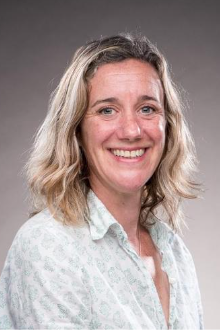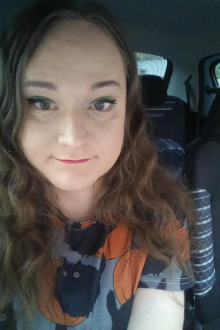Neurodivergent Colleague profiles
Below are profiles of some Neurodivergent Colleagues who have written these for NCW 2023
Catherine Butler, Senior Lecturer in Psychology

Hi, I’m Catherine and a Senior Lecturer in Psychology. I was diagnosed dyslexic in the first term of my undergraduate degree. At school I had always been told I was lazy or stupid and was often in the lower set, so my diagnosis was a relief and it was the first time someone said I must be bright to have got as far as I had without any support. Thank you to that assessor and to my psychology tutor for telling me to go and get an assessment. This new understanding of what was going on for me changed everything and reignited my love of learning and study – so much so that I have completed 3 degrees, started an MBA that I decided not to finish, and I have been a lecture for over a decade.
I love how much dyslexia has forced me to think outside of the box and lead to innovations and a unique ability to connect with others. It also helps me listen carefully to my students with ILPs and help them plan their learning journey to make the most of their time at university.
My 10 year old has also just been diagnosed with dyslexia, and I am fierce at making sure the school are providing her with the support she needs so she does not have the same experience as me in school. My advice would be to feel pride that your brain is wired uniquely, enjoy the different perspectives this gives you and push for the support you need to excel in what you are learning.
Lena Worwood, Equality, Diversity and Inclusion Advisor (History, Psychology)

My name is Lena and last summer I finally got an ADHD diagnosis. It is ridiculous that I didn’t really allow myself to feel like I have ADHD until the diagnosis came through. It took me two years to persuade my doctor to put in a referral. Her first argument was that if I had ADHD I wouldn’t be able to sit down with her and explain why I had ADHD. Eventually, I persuaded her to give me a paper copy of the GP’s referral form to fill in myself. I, of course, lost this. Multiple times. And felt guilty about losing it, and avoided the subject. And only reluctantly went back to her for another attempt. Eventually I switched doctors and found one who was willing to refer me. That put me onto a two year waiting list for diagnosis. In those four years where I knew I matched the diagnostic criteria for ADHD but couldn’t access diagnosis, I allowed people to tell me that self-diagnosis was silly. I didn’t allow myself to feel part of the neurodivergent community, and I therefore didn’t learn about this community, my place in it, and what having ADHD means to me. This was ridiculous, silly, and justifiable only because it’s what society is constantly telling us. There’s this constant message that too many people are being diagnosed, that people are taking on neurodivergent labels when they haven’t been earned them through diagnosis. That we can’t make allowances for everyone who claims to have ADHD, or be autistic.
Some truths:
Getting a diagnosis is hard. The NHS has long waiting lists and even getting on those lists requires social energy, executive functioning, organisational skill, and the ability to present yourself in such a way that distrustful doctors take you seriously. All this means, getting a diagnosis is extra hard for people who are neurodivergent.
This means that neurodiversity is not over diagnosed. It’s under-diagnosed. There are more neurodivergent people than there’s capacity to diagnose. There’s a lot of stigma around autism and ADHD. There are more neurodivergent people than are comfortable admitting it, even to themselves.
You don’t have to wait until someone has a diagnosis before you help them. There is an idea that if someone tells you they have ADHD and would prefer to do things differently, you only have to take that into account if they have a diagnosis. This is untrue. For a start, the Equality Act 2010 protects disabled people whether they have a diagnosis or not. The law protects people if their disability “has a substantial and long-term adverse effect on [their] ability to carry out normal day-to-day activities”. Law aside, if someone tells you they need help your response should not be to ask them to join a two year waiting list to talk to a doctor who can diagnose the need and pass that diagnosis onto specialists who can interpret it. Everyone needs a little help sometimes and meeting people where they are, with the needs they have, is okay.
Thinking back over my life, through the lens of me being neurodivergent. I remember the times I couldn’t do things like other people and didn’t know why:
- I remember a long distance bike ride. Having a mental block about using the bikes gears. Being told to “think about it!” Feeling like a failure. Freezing up. Finding that I couldn’t learn or engage with that any further and doing a 25 mile bike ride in first gear.
- Having to run from one class to another because I needed longer than everyone else to pack my bags at school or I’d lose things.
- Being told to sit still, not fiddle, not doodle. To look like I was paying attention when this meant that I wasn’t.
- People explaining the same things to me over and over again in the same way, knowing that I couldn’t meet their needs in the way they wanted and treating these lectures as something for their benefit, to let off steam. Learning the techniques of active listening so that they would have the comfort of knowing they’d been heard but knowing that I couldn’t change.
- People trying to manage my mistakes by adding extra steps to processes then, when I failed those adding more steps until it’s overwhelming.
- Being overwhelmed by people and noise and having no choice but to hide under a pile of blankets and cry.
I think the key thing is, I learned that other people did things the correct way, and even when I succeeded not doing it their way was a bit of a failure. I learned not to ask for things that would help me, and often, I didn’t have the language to frame what would help me. Learning to act neurotypical is called masking, and it’s a deep learned behaviour. There’s nothing better than when you can drop the mask around people who act and thinking similarly. There’s something really empowering about learning that the things you need are not moral failings just because they differ from what other people need.
I’m working on taking my medications for ADHD – as these meds are stimulants you have to up your dose slowly and I have bad anxiety which means that any increase can send me to bad places mentally. I enjoy the way it’s helped me to feel clearer and more capable of focus though I’ve been working on slowly finding the right dose and medication for nine months now. I try to remember that:
- There is a difference between having a diagnosis, and having coping mechanisms. Don’t let anyone tell you that as you’ve been diagnosed, you’re fine
- There’s a difference between having coping mechanisms and having coping mechanisms that work in all circumstances
- Having coping mechanisms does not mean you’ll meet everyone’s expectations. Sometimes, the coping mechanism is knowing when you can’t do things the way someone would like
The big thing, for me, as someone who was diagnosed with ADHD and came out as trans in my 30s, is that I have an explanation for a lot of things. My life has been full of times when I’ve been unable to do something and unsure why, or sad without an explanation, or failed to act the way others expect even though I wanted to fit in. My ADHD diagnosis explains some of these things for me. But more important than that is a concept of neurodiversity as a community and culture and liberation movement. I feel that this is what gives me a way to understand my diagnosis as a positive thing and something to be worked on. Not something to be cured or diminished.
It also makes me think – who is still sad for no reason? Who acts in ways they don’t yet have a language to understand? Who can’t admit to being neurodivergent, or queer, or to being something we don’t have a language to talk about yet? We talk about neurodiversity mostly in terms of ADHD and autism. But it’s not. It’s a range of different conditions and ways of being. Neurodiversity is a broad term and it covers me with my ADHD, but also people who don’t have the language to describe their neurodivergence yet. I think the absolute key to this is that we don’t always get to understand why people need the help they ask for, or struggle with the things they struggle with. And that’s okay. The world is better when we make space for people to think and act differently.
